|
 The guest speakers for the day were Graham, portrayed by Charles
Starling, who has been interpreting Graham for nearly 30 years,
including 20 years at Lincoln’s New Salem State Historic Site. The guest speakers for the day were Graham, portrayed by Charles
Starling, who has been interpreting Graham for nearly 30 years,
including 20 years at Lincoln’s New Salem State Historic Site.
Lincoln was portrayed by Joe Woodard from Hazel Dell, a small
community located in southeast central Illinois. Woodard began his
career as a Lincoln interpreter at the Lincoln Log Cabin State
Historic Site in Lerna, just south of Charleston, and specializes in
portrayals of Lincoln prior to his election as President of the
United States.
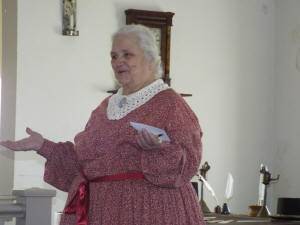
In the courtroom, Barbara Stroud-Borth began the afternoon program
welcoming guests to the Mount Pulaski Courthouse and introducing the
two guest speakers.
 Lincoln talked to the group first. He spoke about his upcoming trip
to Washington D.C. as he had been elected President of the United
States. He told the audience he was not sure how he felt about being
elected. He noted that since folks in Springfield had learned he
would be the president, they had flocked to him asking him to give
them jobs. He felt he had probably heard from more people wanting
jobs than there were jobs available in the nation’s capital.

Lincoln also said he felt bad about leaving Springfield. The town
was his home and one that he loved. He concluded though that God
willing he would return someday. Because he planned to come home
when he was done being president, he asked his law partner not to
remove the Lincoln name from the shield that hung over the door at
their law practice.
Lincoln also reported that there had been a misunderstanding of his
intent to abolish slavery in the southern states. He said he was
called an abolitionist, but he never sought to abolish slavery. What
he did intend to do was prevent the spread of slavery into other
states where it did not yet exist.
Lincoln said he felt that if states where it was not legal to own
slaves were prevented from changing that practice, then slavery
would eventually abolish itself in the states where it did exist. He
said it would die out and exist no longer, thus eliminating the
problem on its own.
Later, Lincoln would also recite the speech he gave as he departed
Springfield, headed to Washington, where he noted that he might
never see the community again.


Mentor Graham was the next to address the courtroom filled with
guests including several youngsters. Graham lived in the
Petersburg/New Salem area where he taught school. While Lincoln was
an adult when he moved to New Salem, he was not highly educated. He
befriended Graham and learned much from the teacher on an informal
basis.
Graham spoke to the audience about what school was like in the early
to mid-1800’s. In New Salem, the school was called a “blab” school
in that the classroom was often a loud place as children were
instructed to recite aloud their lessons.
Graham said there were no grade levels at that time, kids went to
school, and they learned the lessons, and that was it. He said that
what he did do as an instructor was divide his room into kids who
had gone to school before and kids who had not.
There were rules to be followed and punishment for breaking those
rules. Rules included no one was allowed to cross their legs.
Everyone sat with both feet on the floor and knees together. Every
question asked of a student was to be responded to with “sir,”
showing respect for the teacher.

Graham went about the room, addressing the current violations in the
room and scolding his “students” for misbehaving. He explained that
punishment included “black marks,” “corporal punishment,” and
“expulsion.”
He asked some questions of the students in the room, and admonished
those who failed to end their responses with the word “sir.”
Finally, he set the students to work. With the students who were
returning to school, he set them to doing some “cyphering.” For
those who were new, the first step of learning was to learn the
alphabet; he set that group to reciting their ABC’s.
The cyphering class was to recite
Twice one is two – this book is very new
Twice two is four – trace it on the floor
Twice three is six – we’re always playing tricks
Twice four is eight – the boys are always late
Twice five is ten – let’s do it all again
Graham got the group started, then instructed them to continue with
their cyphering until he told them to stop. He then went to the new
students and got them started on reciting their alphabet. In no time
the courtroom was a roar of noise that was hardly discernable
between the two groups.
Graham finally stopped the chaos and said that the intense noise
from the student’s recitations could have been heard outside by a
passersby, which is how the school got labeled as a blab school
because people would pass by and hear all the blabbering.
Graham concluded his talk about school then fielded questions from
the audience, including how tuition was paid. He said that students
attended school at their parent’s discretion, sometimes there and
sometimes not, depending on what needed to be done at home. He said
class had to start later in the morning because kids had chores to
do at home. It also ended earlier in the day again because of chore
time. He noted also that kids were dismissed from school at the end
of the day depending on how far they had to walk to get home. All
the children needed to be in their homes before dark because of the
threat of wild animals. So, if kids lived, for example, eight miles
from the school, they were dismissed early, while children who lived
in town were held longer.
Graham also shared some insight into some of the terminology
associated with money. He asked who had a buck. Someone produced a
dollar bill, as expected. Graham explained that in the early days,
animal skins held value. The hide of a male deer, or buck, was worth
one dollar. Therefore, it became common for some to refer to a
dollar bill as a buck.

He also asked if anyone had some dough. He explained that a doe skin
was worth less than a dollar, so when people had change that
amounted to less than a dollar, they had doe, not dough.
Graham, as well as Lincoln, continued to field questions from the
audience for several minutes before closing the day’s program.
Guests were encouraged to visit the downstairs area, and also enjoy
refreshment before departing.
[to top of second column] |
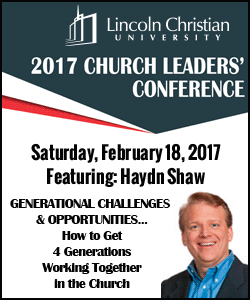
Downstairs there was of course food. Instead of a birthday cake, the
celebration offered guests the opportunity to enjoy one of Lincoln’s
favorite desserts – apple pie with rum sauce. There was also a large
selection of cookies served along with punch and coffee.
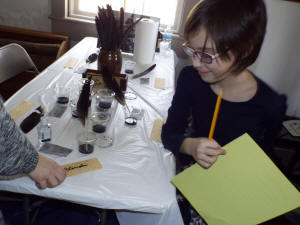
In the downstairs rooms, there were various activities going on for
children and adults. In one room, everyone interested in giving it a
try could take up a feather quill pen and do their best at imitating
Lincoln’s signature.
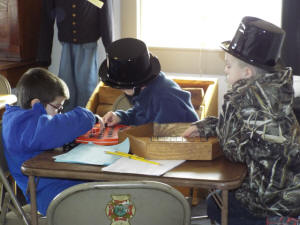
In another room, kids could enjoy old fashioned board games such as
checkers.

Stepping across the hall, there was a volunteer handing out stove
pipe hats and “Lincoln beards” to anyone who wished to practice
being a Lincoln impersonator. Adults and kids alike could also
take the Lincoln quiz or participate in a Mount Pulaski Courthouse
Scavenger Hunt.
 For the scavenger hunt, participants had to go around inside the
courthouse and find the answers to questions such as how many stars
are on the flag in the upstairs courtroom, and how many Lincoln top
hats are always on display at the courthouse.
Lincoln quiz questions included where was he born, what was the name
of Lincoln’s family dog, and what was Lincoln’s most famous speech?
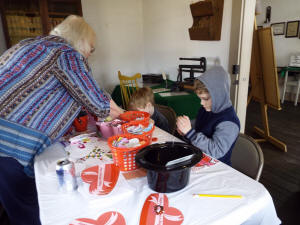
In honor of Valentine’s Day, also around the corner, the last stop
for some of the kids was a craft room where they could create a
‘make and take’ Valentine card to give later to a family member or
friend.
For this day, there was also a photo display set up providing
information about Mentor Graham, his wife, and descendants. Graham
was featured downstairs in the photo display and was also making an
appearance upstairs in the Courtroom.


The Mentor Graham family

Mentor and Sarah Graham
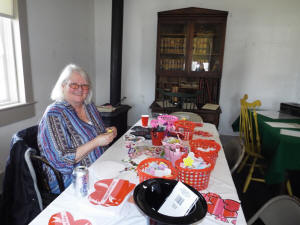
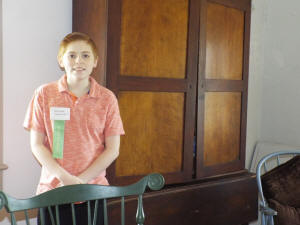



Logan County Tourism Director
Bill Hoagland with Barbara Stroud-Borth.

Representative Tim Butler
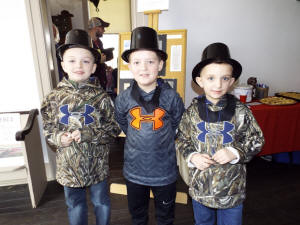
[Nila Smith] |